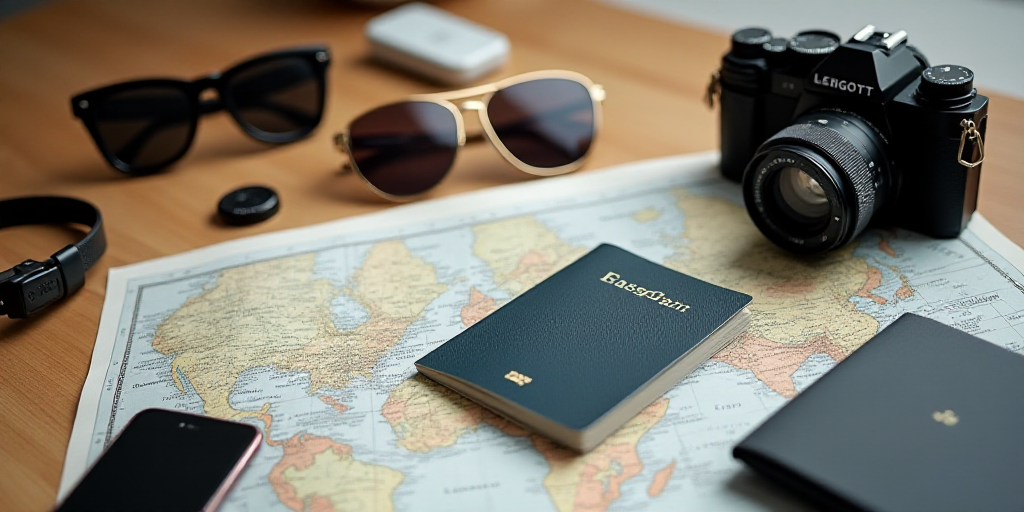Inspired by Cervantes: “Traveling makes a man discreet”
This quote from Miguel de Cervantes, written in 1617, remains relevant today. Traveling shapes us but also requires prudence and foresight. Beyond the excitement of discovering new destinations, travel involves a series of preparations that should not be taken lightly. Foresight covers everything from basic issues like passport validity to flight and accommodation cancellation policies. It also includes decisions such as carrying digital copies of important documents to anticipate potential setbacks.
Before You Depart
Here are some fundamental aspects that are often underestimated:
- Ensure your passport is valid for at least six months beyond your entry date, a common requirement in many countries.
- Vaccinations also require attention. It’s not enough to review those for your first destination; subsequent countries might require proof of vaccination if you’ve visited specific regions. For instance, after visiting Brazil, Colombia or South Africa might request proof of yellow fever vaccination.
- Carry both physical and digital copies of key documents (passport, visas, reservations, insurance) in case of loss or theft.
- Regarding luggage, using location devices like AirTags to track bags in real-time has become popular. Also, consider using luggage locks or plastic seals to prevent tampering during transit.
The Importance of Comprehensive Insurance
Another crucial aspect is insurance, ensuring it covers all necessary aspects:
- Typically, travel insurance policies cover recreational sports activities unless they are professional-level. However, some like skydiving or scuba diving may require a liability waiver, potentially invalidating coverage. Always read the terms carefully before agreeing to such conditions.
- When purchasing insurance, it’s wise to check the reputation of the insurer through comparison websites, networks, or even quick AI tool consultations to get a summary of common complaints and opinions.
- Remember that many gold or premium credit cards include travel insurance, medical assistance, or cancellation coverage. However, these usually come with conditions: you must have paid for the flight using that card, and they may exclude certain countries or activities. Reading the fine print is crucial to avoid surprises or double payments.
- When booking flights or accommodations, pay attention to confusing cancellation policies, hidden late check-in fees, cleaning charges, or currency changes. These practices are common among budget airlines and rental platforms.
- Car rentals also have their tricks. Many companies offer additional insurance that duplicates coverage you might already have through your card or an independent policy. Check if the basic insurance covers vehicle damage, civil liability, or roadside assistance to avoid overpaying.
Luggage for Connecting Flights
For flights with layovers, it’s crucial to know if baggage transfers automatically or if you need to collect and recheck it. Also, allow realistic margins between connections, especially in large airports or those with immigration checks, as not all fares include free rebooking if you miss your next flight.
Vacationing Without Looking Like It
Planning should also consider what you leave behind:
- To prevent your home from appearing unoccupied, ask a trusted individual to collect mail or open and close blinds. Smart light timers or connected cameras add extra security.
- On social media, it’s advisable to avoid real-time posts about being away. Publicly announcing your travels or sharing live locations can put you at risk if your profile is public. It’s safer to share content upon return or limit visibility to close contacts.
Avoiding Tourist Traps
Once at your destination, the challenge is to avoid tourist traps:
- Restaurants with inflated prices near landmarks or souvenir shops lacking authenticity are examples.
- Free walking tours can be a good option for exploring the city, especially if traveling on a budget. However, not all guides are accredited, and services depend on tips, so it’s wise to compare options and research previous reviews.
Seeking Local Experiences
Fortunately, modern tourism seeks authenticity and is more aware of its impact. Thus, more people prefer proposals designed by locals:
- Dining experiences in private homes (Eatwith), meetings with strangers (Timeleft), alternative urban tours, or even transformative talks like those of The Human Library.
- Platforms such as Airbnb Experiences, Get Your Guide, Flytographer, or Withlocals expand these options with creative workshops, photography sessions, or guided tours by residents.
Key Questions and Answers
- Q: How long should my passport be valid for? A: Ensure it’s valid for at least six months beyond your entry date, a common requirement in many countries.
- Q: What about vaccinations? A: Review those for your first destination, but be aware that subsequent countries might require proof of vaccination if you’ve visited specific regions.
- Q: What should I do with my luggage during layovers? A: Check if baggage transfers automatically or if you need to collect and recheck it. Allow realistic margins between connections.
- Q: How can I protect my home while away? A: Ask a trusted person to collect mail or open/close blinds. Use smart light timers or connected cameras for added security.
- Q: What insurance do I need? A: Ensure it covers all necessary aspects, including potential liability waivers for activities like skydiving or scuba diving. Always read the terms carefully.
- Q: How can I avoid tourist traps? A: Research local experiences designed by residents through platforms like Airbnb Experiences or Get Your Guide.






